AWM41 1072 - [Official History, 1914-18 War: Records of Arthur G Butler:] Interviews containing accounts of Nursing experiences in the AANS [Australian Army Nursing Service]. These nurses were interviewed by Matron Kellett - Part 3
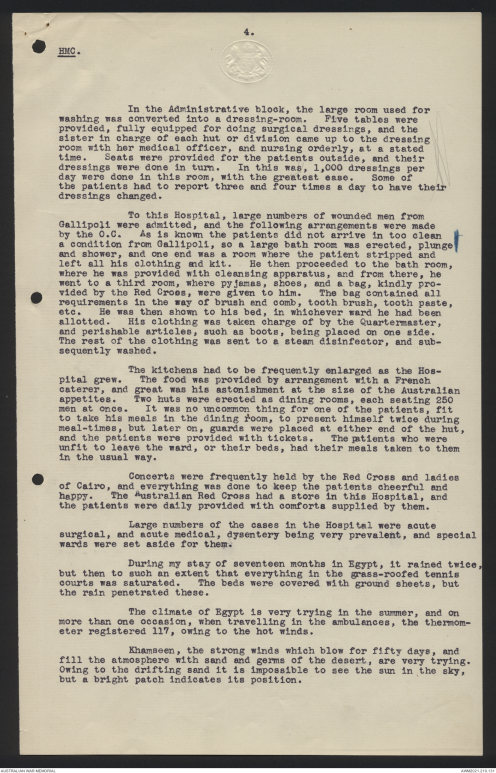
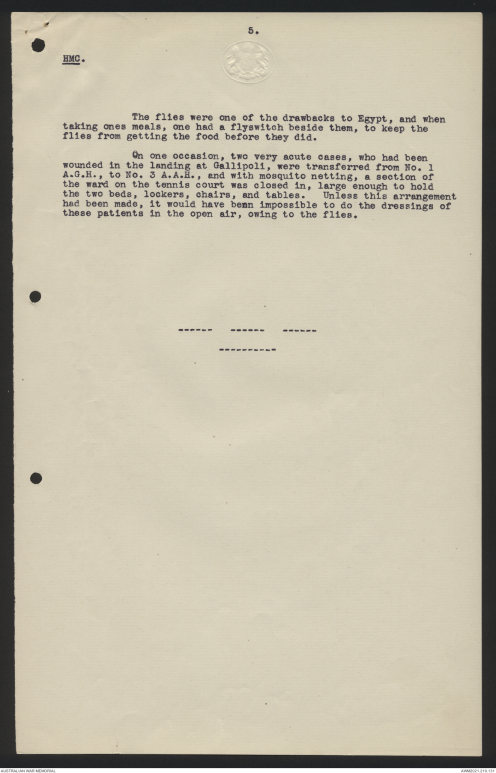
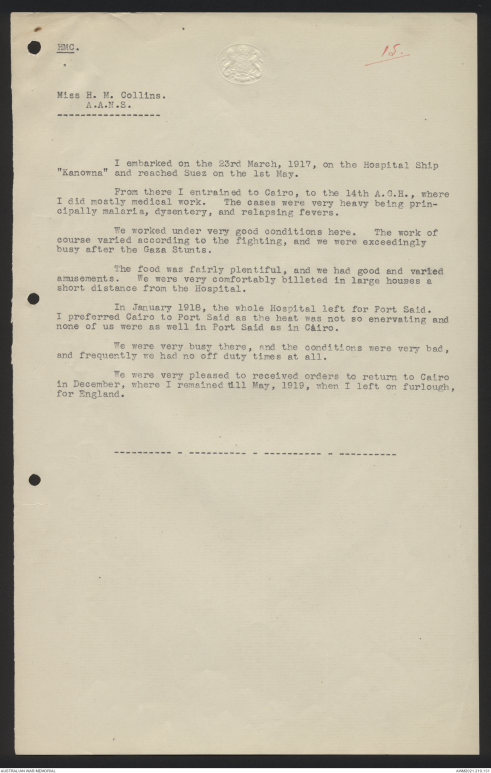
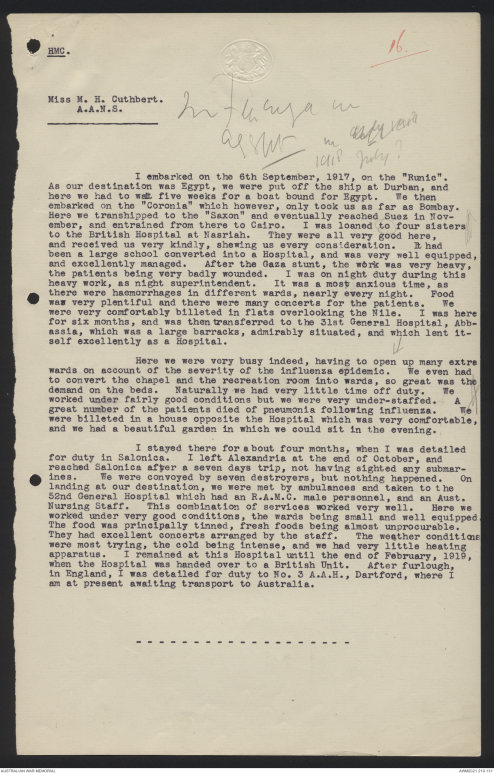
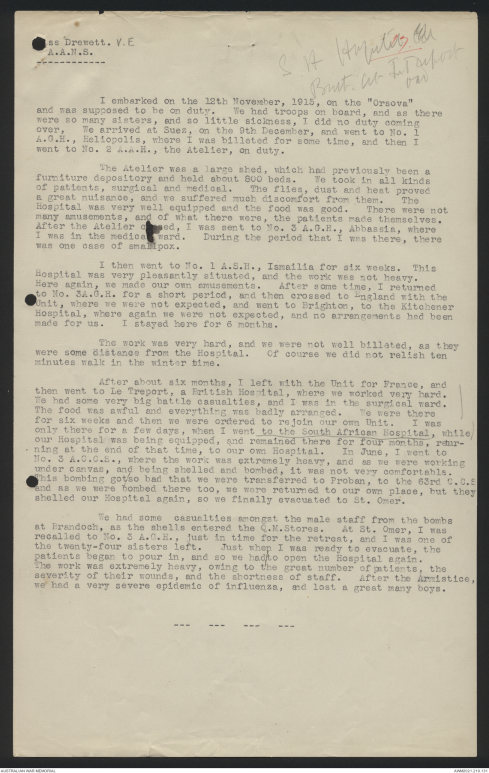
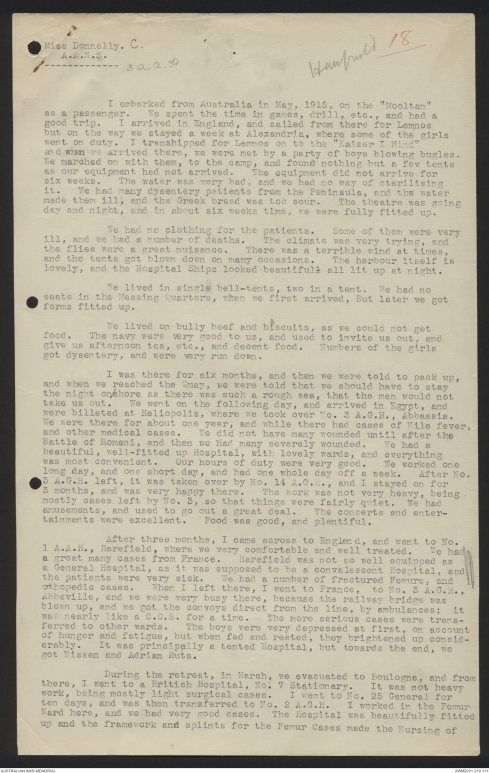
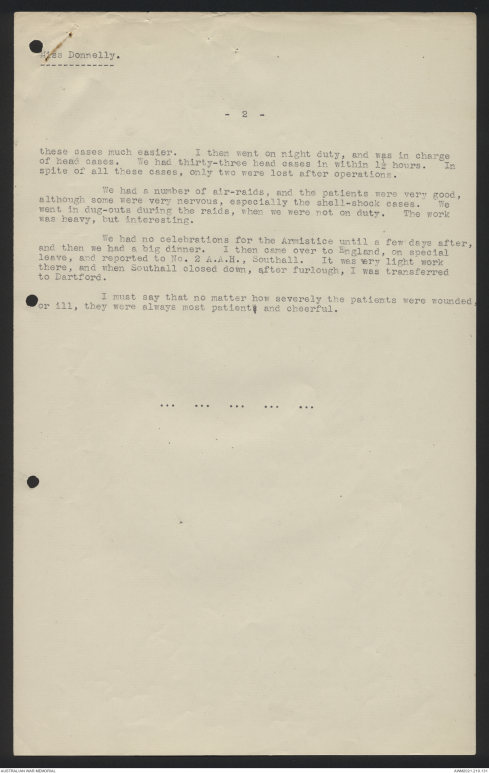
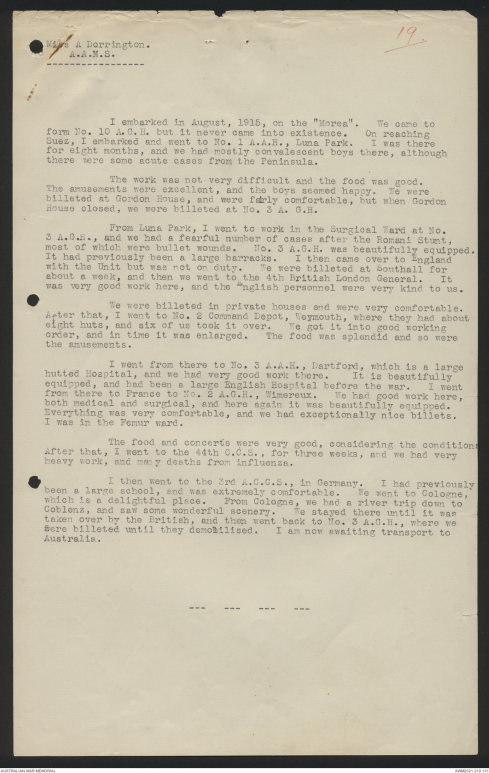
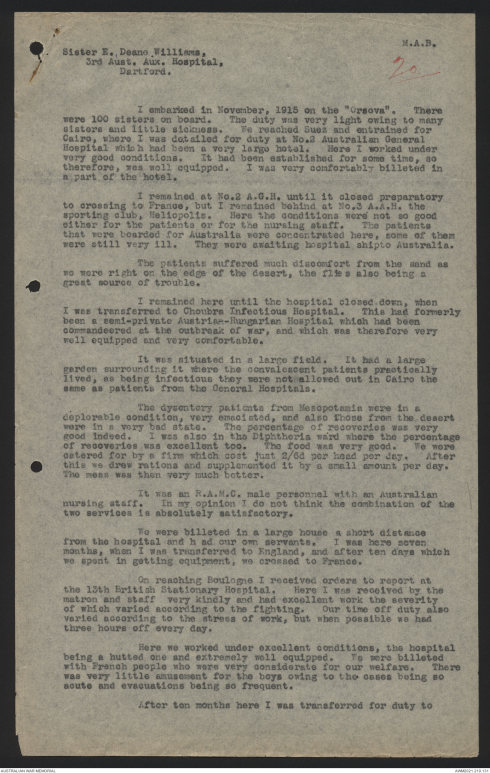
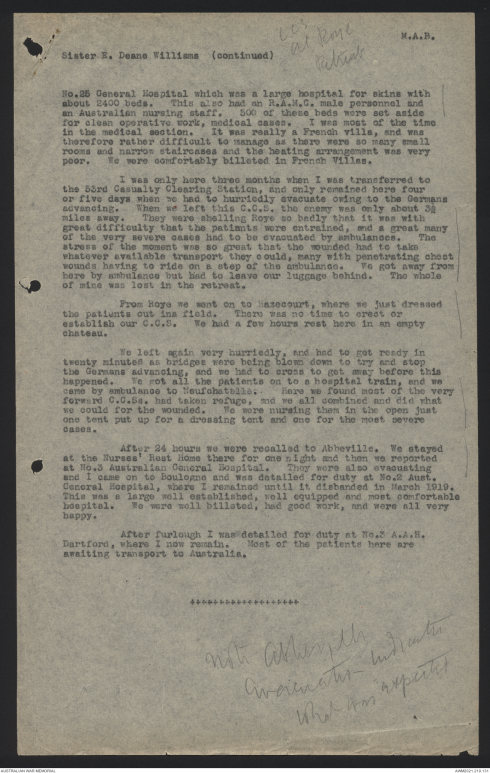
4.
HMC.
In the Administrative block, the large room used for
washing was converted into a dressing-room. Five tables were
provided, fully equipped for doing surgical dressings, and the
sister in charge of each hut or division came up to the dressing
room with her medical officer, and nursing orderly, at a stated
time. Seats were provided for the patients outside, and their
dressings were done in turn. In this was, 1,000 dressings per
day were done in this room, with the greatest ease. Some of
the patients had to report three and four times a day to have their
dressings changed.
To this Hospital, large number of wounded men from
Gallipoli were admitted, and the following arrangements were made
by the O.C. As is known the patients did not arrive in too clean
a condition from Gallipoli, so a large bath room was erected, plunge
and shower, and one end was a room where the patient stripped and
left all his clothing and kit. He then proceeded to the bath room,
where he was provided with cleansing apparatus, and from there, he
went to a third room, where pyjamas, shoes, and a bag, kindly provided
by the Red Cross, were given to him. The bag contained all
requirements in the way of brush and comb, tooth brush, tooth paste,
etc. He was then shown to his bed, in whichever ward he had been
allotted. His clothing was taken charge of by the Quartermaster,
and perishable articles, such as boots, being placed on one side.
The rest of the clothing was sent to a steam disinfector, and
subsequently washed
The kitchens had to be frequently enlarged as the Hospital
grew. The food was provided by arrangement with a French
caterer, and great was his astonishment at the size of the Australian
appetites. Two huts were erected as dining rooms, each seating 250
men at once. It was no uncommon thing for one of the patients, fit
to take his meals in the dining room, to present himself twice during
meal-times, but later on, guards were placed at either end of the hut,
and the patients were provided with tickets. The patients who were
unfit to leave the ward, or their beds, had their meals taken to them
in the usual way.
Concerts were frequently held by the Red Cross and ladies
of Cairo, and everything was done to keep the patients cheerful and
happy. The Australian Red Cross had a store in this Hospital, and
the patients were daily provided with comforts supplied by them.
Large numbers of the cases in the Hospital were acute
surgical, and acute medical, dysentery being very prevalent, and special
wards were set aside for them.
During my stay of seventeen months in Egypt, it rained twice,
but then to such an extent that everything in the grass-roofed tennis
courts was saturated. The beds were covered with the ground sheets, but
the rain penetrated these.
The climate of Egypt is very trying in the summer, and on
more than one occasion, when travelling in the ambulances, the thermometer
registered 117, owing to the hot winds.
Khamseen, the strong winds which blow for fifty days, and
fill the atmosphere with sand and germs of the desert, are very trying.
Owing to the drifting sand it is impossible to see the sun in the sky,
but a bright patch indicates its position.
5.
HMC.
The flies were one of the drawbacks to Egypt, and when
taking ones meals, one had a flyswitch beside them, to keep the
flies from getting the food before they did.
On one occasion, two very acute cases, who had been
wounded in the landing at Gallipoli, were transferred from No. 1
A.G.H., to No. 3 A.A.H., and with mosquito netting, a section of
the ward on the tennis court was closed in, large enough to hold
the two beds, lockers, chairs, and tables. Unless this arrangement
had been made, it would have been impossible to do the dressings of
these patients in the open air, owing to the flies.
HMC.
15.
Miss H. M. Collins.
A.A.N.S.
I embarked on the 23rd March, 1917, on the Hospital Ship
"Kanowna" and reached Suez on the 1st May.
From there I entrained to Cairo, to the 14th A.G.H., where
I did mostly medical work. The cases were very heavy being principally
malaria, dysentery, and relapsing fevers.
We worked under very good conditions here. The work of
course varied according to the fighting, and we were exceedingly
busy after the Gaza Stunts.
The food was fairly plentiful, and we had good and varied
amusements. We were very comfortably billeted in large houses a
short distance from the Hospital.
In January 1918, the whole Hospital left for Port Said.
I preferred Cairo to Port Said as the heat was not so enervating and
none of us were as well in Port Said as in Cairo.
We were very busy there, and the conditions were very bad,
and frequently we had no off duty times at all.
We were very pleased to received orders to return to Cairo
in December, where I remained till May, 1919, when I left on furlough,
for England.
HMC.
16.
Miss M. H. Cuthbert.
A.A.N.S.
[*Influenza
Egypt*]
1918 July
I embarked on the 6th September, 1917, on the "Runic".
As our destination was Egypt, we were put off the ship at Durban, and
here we had to wait five weeks for a boat bound for Egypt. We then
embarked on the "Coronia" which however, only took us as far as Bombay.
Here we transhipped to the "Saxon" and eventually reached Suez in November,
and entrained from there to Cairo. I was loaned to four sisters
to the British Hospital at Nasriah. They were all very good here,
and received us very kindly, shewing us every consideration. It had
been a large school converted into a Hospital, and was very well equipped,
and excellently managed. After the Gaza stunt, the work was very heavy,
the patients being very badly wounded. I was on night duty during this
heavy work, as night superintendent. It was a most anxious time, as
there were haemorrhages in different wards, nearly every night. Food
was very plentiful and there were many concerts for the patients. We
were very comfortably billeted in flats overlooking the Nile. I was here
for six months, and was then transferred to the 31st General Hospital, Abbassia,
which was a large barracks, admirably situated, and which lent itself
excellently as a Hospital.
Here we were very busy indeed, having to open up many extra
wards on account of the severity of the influenza epidemic. We even had
to convert the chapel and the recreation room into wards, so great was the
demand on the beds. Naturally we had very little time off duty. We
worked under fairly good conditions but we were very under-staffed. A
great number of the patients died of pneumonia following influenza. We
were billeted in a house opposite the Hospital which was very comfortable,
and we had a beautiful garden in which we could sit in the evening.
I stayed there for a bout four months, when I was detailed
for duty in Salonica. I left Alexandria at the end of October, and
reached Salonica after a seven days trip, not having sighted any submarines.
We were convoyed by seven destroyers, but nothing happened. On
landing at our destination, we were met by ambulances and taken to t he
52nd General Hospital which had an R.A.M.C. male personnel, and an Aust.
Nursing Staff. This combination of services worked very well. Here we
worked under very good conditions, the wards being small and well equipped.
The food was principally tinned, fresh foods being almost unprocurable.
They had excellent concerts arranged by staff. The weather conditions
were most trying, the cold being intense, and we had very little heating
apparatus. I remained at this Hospital until the end of February, 1919,
when the Hospital was handed over to a British Unit. After furlough,
in England, I was detailed for duty to No. 3 A.A.H., Dartford, where I
am at present awaiting transport to Australia.
17.
Miss Drewett. V. E.
A.A.N.S.
[*S H Hospital*]
[*Brit. at [[?]] Depot
oar*]
I embarked on the 12th November, 1915, on the "Orsova"
and was supposed to be on duty. We had troops on board, and as there
were so many sisters, and so little sickness, I did no duty coming
over, We arrived at Suez, on the 9th December, and went to No. 1
A.G.H., Heliopolis, where I was billeted for some time, and then I
went to No. 2 A.A.H., the Atelier, on duty.
The Atelier was a large shed, which had previously been a
furniture depository and held about 800 beds. We took in all kinds
of patients, surgical and medical. The flies, dust and heat proved
a great nuisance, and we suffered much discomfort from them. The
Hospital was very well equipped and the food was good. There were not
many amusements, and of what there were, the patients made themselves.
After the Atelier closed, I was sent to No. 3 A.G.H., Abbassia, where
I was in the medical ward. During the period that I was there, there
was one case of smallpox.
I then went to No. 1 A.S.H., Ismailia for six weeks. This
Hospital was very pleasantly situated, and the work was not heavy.
Here again, we made our own amusements. After some time, I returned
to No. 3A.G.H. for a short period, and then crossed to England with the
Unit, where we were not expected, and went to Brighton, to the Kitchener
Hospital, where again we were not expected, and no arrangements had been
made for us. I stayed here for 6 months.
The work was very hard, and we were not well billeted, as they
were some distance from the Hospital. Of course we did not relish ten
minutes walk in the winter time.
After about six months, I left with the Unit for France, and
then went to Le Treport, a British Hospital, where we worked very hard.
We had some very big battle casualties, and I was in the surgical ward.
The food was awful and everything was badly arranged. We were there
for six weeks and then we were ordered to rejoin our own Unit. I was
only there for a few days, when I went to the South African Hospital, while
our Hospital was being equipped, and remained there for four months, returning
at the end of that time, to our own Hospital. In June, I went to
No. 3 A.C.C.S., where the work was extremely heavy, and as we were working
under canvas, and being shelled and bombed, it was not very comfortable.
This bombing got/so bad that we were transferred to Proban, to the 63rd C.C.S.
and as we were bombed there too, we were returned to our own place, but they
shelled our Hospital again, so we finally evacuated to St. Omer.
We had some casualties amongst the male staff from the bombs
at Brandoch, as the shells entered the Q.M.Stores. At St. Omer, I was
recalled to No. 3 A.G.H., just in time for the retreat, and I was one of
the twenty-four sisters left. Just when I was ready to evacuate, the
patients began to pour in, and so we had/to open the Hospital again.
The work was extremely heavy, owing to the great number of patients, the
severity of their wounds, and the shortness of staff. After the Armistice,
we had a very severe epidemic of influenza, and lost a great many boys.
18
Miss Donnelly. C.
A.A.N.S.
[[s. a. a. ?]]
Harefield
I embarked from Australia in May, 1915, on the "Mooltan"
as a passenger. We spent the time in games, drill, etc., and had a
good trip. I arrived in England, and sailed from there for Lemnos
but on the way we stayed a week at Alexandria, where some of the girls
went on duty. I transhipped for Lemnos on to the "Kaiser I Hind"
and when we arrived there, we were met by a party of boys blowing bugles.
We marched on with them, to the camp, and found nothing but a few tents
as our equipment had not arrived. The equipment did not arrive for
six weeks. The water was very bad, and we had no way of sterilising
it. We had many dysentery patients from the Peninsula, and the water
made them ill, and the Greek bread was too sour. The theatre was going
day and night, and in about six weeks time, we were fully fitted up.
We had no clothing for the patients. Some of them were very
ill, and we had a number of deaths. The climate was very trying, and
the flies were a great nuisance. There was a terrible wind at times,
and the tents got blown down on many occasions. The harbour itself is
lovely, and the Hospital Ships looked beautifull all lit up at night.
We lived in single bell-tents, two in a tent. We had no
seats in the Messing Quarters, when we first arrived, But later we got
forms fitted up.
We lived on bully beef and biscuits, as we could not get
food. The navy were very good to us, and used to invite us out, and
give us afternoon tea, etc., and decent food. Numbers of the girls
got dysentery, and were very run down.
I was there for six months, and then we were told to pack up,
and when we reached the Quay, we were told that we should have to stay
the night on/shore as there was such a rough sea, that the men would not
take us out. We went on the following day, and arrived in Egypt, and
were billeted at Heliopolis, where we took over No. 3 A.G.H., Abbassia.
We were there for about one year, and while there had cases of Nile fever,
and other medical cases. We did not have many wounded until after the
Battle of Romani, and then we had many severely wounded. We had a
beautiful, well-fitted up Hospital, with lovely wards, and everything
was most convenient. Our hours of duty were very good. We worked one
long day, and one short day, and one whole day off a week. After No.
3 A.G.H. left, it was taken over No. 14 A.G.H., and I stayed on for
3 months, and was very happy there. The work was not very heavy, being
mostly cases left by No. 3, so that things were fairly quiet. We had
amusements, and used to go out a great deal. The concerts and entertainments
were excellent. Food was good, and plentiful.
After three months, I came across to England, and to No.
1 A.A.H., Harefield, where we very comfortable and well treated. We had
a great many cases from France. Harefield was not so well equipped as
a General Hospital, as it was supposed to be a convalescent Hospital, and
the patients were very sick. We had a number of fractured Femurs, and
othopedic cases. When I left there, I went to France, to No. 3 A.G.H.,
Abbeville, and we were very busy there, because the railway bridge was
blown up, and we got the convoys direct from the line, by ambulances; it
was nearly like a C.C.S. for a time. The more serious cases were transferred
to other wards. The boys were very depressed at first, on account
of hunger and fatigue, but when fed and rested, they brightened up considerably.
It was principally a tented Hospital, but towards the end, we
got Nissen and Adrian Huts.
During the retreat, in March, we evacuated to Boulogne, and from
there, I went to a British Hospital, No. 7 Stationary. It was not heavy
work, being mostly light surgical cases. I went to No. 25 General for
ten days, and was then transferred to No. 2 A.G.H. I worked in the Femur
Ward here, and we had very good cases. The Hospital was beautifully fitted
up and the framework and splints for the Femur Cases made the Nursing of
Miss Donnelly.
- 2 -
these cases much easier. I then went on night duty, and was in charge
of head cases. We had thirty-three head cases in within 1½ hours. In
spite of all these cases, only two were lost after operations.
We had a number of air-raids, and the patients were very good,
although some were very nervous, especially the shell-shock cases. We
went in dug-outs during the raids, when we were not on duty. The work
was heavy, but interesting.
We had no celebrations for the Armistice until a few days after,
and then we had a big dinner. I then came over to England, on special
leave, and reported to No. 2 A.A.H., Southall. It was very light work
there, and when Southall closed down, after furlough, I was transferred
to Dartford.
I must say that no matter how severely the patients were wounded,
or ill, they were always most patients and cheerful.
19
Miss A. Dorrington.
A.A.N.S.
I embarked in August, 1915, on the "Morea". We came to
form No. 10 A.C.H. but it never came into existence. On reaching
Suez, I embarked and went to No. 1 A.A.H., Luna Park. I was there,
for eight months, and we had mostly convalescent boys there although
there were some acute cases from the Peninsula.
The work was not very difficult and the food was good.
The amusements were excellent, and the boys seemed happy. We were
billeted at Gordon House, and were fairly comfortable, but when Gordon
House closed, we were billeted at No. 3 A. G.H.
From Luna Park, I went to work in the Surgical Ward at No.
3 A.G.H., and we had a fearful number of cases after the Romani Stunt,
most of which were bullet wounds. No 3 A.G.H. was beautifully equipped.
It had previously been a large barracks. I then came over to England
with the Unit but was not on duty. We were billeted at Southall for
about a week, and then we went to the 4th British London General. It
was very good work here, and the English personnel were very kind to us.
We were billeted in private houses and were very comfortable.
After that, I went to No. 2 Command Depot, Weymouth, where they had about
eight huts, and six of us took it over. We got it into good working
order, and in time it was enlarged. The food was splendid and so were
the amusements.
I went from there to No. 3 A.A.H. Dartford, which is a large
hutted Hospital, and we had very good work there. It is beautifully
equipped, and had been a large English Hospital before the war. I went
from there to France to No. 2 A.G.H., Wimereux. We had good work here,
both medical and surgical, and here again it was beautifully equipped.
Everything was very comfortable, and we had exceptionally nice billets.
I was in the Femur ward.
The food and concerts were very good, considering the conditions.
After that, I went to the 44th C.C.S., for three weeks, and we had very
heavy work, and many deaths from influenza.
I then went to the 3rd A.C.C.S., in Germany. I had previously
been a large school, and was extremely comfortable. We went to Cologne,
which is a delightful place. From Cologne, we had a river trip down to
Coblenz, and saw some wonderful scenery. We stayed there until it was
taken over by the British, and then went back to No. 3 A.G.H., where we
were billeted until they demobilised. I am now awaiting transport to
Australia.
20
M.A.B.
Sister E. Deane Williams
3rd Aust. Aux. Hospital,
Dartford
I embarked in November, 1915 on the "Orsova". There
were 100 sisters on board. The duty was very light owing to many
sisters and little sickness. We reached Suez and entrained for
Cairo, where I was detailed for duty at No.2 Australian General
Hospital which had been a very large hotel. Here I worked under
very good conditions. It had been established for some time, so
therefore, was well equipped. I was very comfortably billeted in
a part of the hotel.
I remained at No.2 A.G.H. until it closed preparatory
to crossing to France, but I remained behind at No.3 A.A.H. the
sporting club, Heliopolis. Here the conditions were not so good
either for the patients or for the nursing staff. The patients
that were boarded for Australia were concentrated here, some of them
were still very ill. They were awaiting hospital shipto Australia.
The patients suffered much discomfort from the sand as
we were right on the edge of the desert, the flies also being a
great source of trouble.
I remained here until the hospital closed down. when
I was transferred to Choubra Infectious Hospital. This had formerly
been a semi-private Austrian-Hungarian Hospital which had been
commandeered at the outbreak of war, and which was therefore very
well equipped and very comfortable.
It was situated in a large field. It had a large
garden surrounding it where the convalescent patients practically
lived, as being infectious they were not allowed out in Cairo the
same as patients from the General Hospitals.
The dysentery patients from Mesopotamia were in a
deplorable condition, very emaciated, and also those from the desert
were in a very bad state. The percentage of recoveries was very
good indeed. I was also in the Diphtheria ward where the percentage
of recoveries was excellent too. The food was very good. We were
catered for by a firm which cost just 2/6 per head per day. After
this we drew rations and supplemented it by a small amount per day.
The mess was then very much better.
It was an R.A.M.C. male personnel with an Australian
nursing staff. In my opinion I do not think the combination of the
two services is absolutely satisfactory.
We were billeted in a large house a short distance
from the hospital and h ad our own servants. I was here seven
months, when I was transferred to England, and after ten days which
we spent in getting equipment, we crossed to France.
On reaching Boulogne I received orders to report at
the 13th British Stationary Hospital. Here I was received by the
matron and staff very kindly and had excellent work the severity
of which varied according to the fighting. Our time off duty also
varied according to the stress of work, but when possible we had
three hours off every day.
Here we worked under excellent conditions, the hospital
being a hutted one and extremely well equipped. We were billeted
with French people who were very considerate for our welfare. There
was very little amusement for the boys owing to the cases being so
acute and evacuations being so frequent.
After ten months here I was transferred for duty to
M.A.B.
Sister E. Deane Williams (continued) [*C.C.S. at Roye Retreat*]
No.25 General Hospital which was a large hospital for skins with
about 2400 beds. This also had an R.A.M.C. male personnel and
an Australian nursing staff. 500 of these beds were set aside
for clean operative work, medical cases. I was most of the time
in the medical section. It was really a French villa, and was
therefore rather difficult to manage as there were so many small
rooms and narrow staircases and the heating arrangement was very
poor. We were comfortably billeted in French Villas.
I was only here three months when I was transferred to
the 53rd Casualty Clearing Station, and only remained here four
or five days when we had to hurriedly evacuate owing to the Germans
advancing. When we left this C.C.S. the enemy was only about 3½
miles away. They were shelling Roye so badly that it was with
great difficulty that the patients were entrained, and a great many
of the very severe cases had to be evacuated by ambulances. The
stress of the moment was so great that the wounded had to take
whatever available transport they could, many with penetrating chest
wounds having to ride on a step of the ambulance. We got away from
here by ambulance but had to leave our luggage behind. The whole
of mine was lost in the retreat.
From Roye we went on to Hazecourt, where we just dressed
the patients out ina field. There was no time to erect or
establish our C.C.S. We had a few hours rest here in an empty
chateau.
We left again very hurriedly, and had to get ready in
twenty minutes as bridges were being blown down to try and stop
the Germans advancing, and we had to cross to get away before this
happened. We got all the patients on to a hospital train, and we
came by ambulance to Neufchatelle. Here we found most of the very
forward C.C.Ss. had taken refuge, and we all combined and did what
we could for the wounded. We were nursing them in the open just
one tent put up for a dressing tent and one for the most severe
cases.
After 24 hours we were recalled to Abbeville. We stayed
at the Nurses' Rest Home there for one night and then we reported
at No.3 Australian General Hospital. They were also evacuating
and I came on to Boulogne and was detailed for duty at No.2 Aust.
General Hospital, where I remained until it disbanded in March 1919.
This was a large well established, well equipped and most comfortable
hospital. We were well billeted, had good work, and were all very
happy.
After furlough I was detailed for duty at No.3 A.A.H.
Dartford, where I now remain. Most of the patients here are
awaiting transport to Australia.
[*Note Abbeville
[[Mor?]] -- indicates
what was expected *]
 Sam scott
Sam scottThis transcription item is now locked to you for editing. To release the lock either Save your changes or Cancel.
This lock will be automatically released after 60 minutes of inactivity.